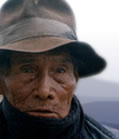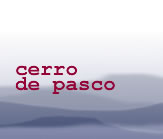THEMES IN THIS
TESTIMONY
Community Activities

Education

Employment and Income

Environment

Identity

Industry

Social Change

Click on arrows
to find more
testimonies
featuring
these themes
|
|
Sex
|
male
|
|
|
Age
|
65
|
|
|
Occupation
|
retired miner
|
|
|
Location
|
Quiulacocha
|
|
|
Date
|
1995
|
|
summary
On the advice of his father who, as a landless comunero (registered community member with rights and resposibilities), was unable to foresee a future in agriculture, Hilario has worked for many years as a miner. Now retired, he works in livestock rearing in a cooperative with his son. His formal education is limited and he lacked a solid family background. His mother died when he was very young and his father worked in a mining camp away from the community.
The lack of options for the poor and landless means that mining is viewed as a secure and even attractive alternative occupation. Don Hilario is clearly aware from first-hand experience, that conditions were tough and exploitative but offers no further details or opinions on this. He is very perceptive, however, on the way that working in the mines fosters a kind of short-termism among miners, including himself, whereby the security of their salary was more important than the impact the company had on the local environment. Miners just focus on the work and the pay, even ignoring the effect on their health. He highlights how finally he saw beyond this, and was forced to think and do something to protest. When he was young, he admits, he “…felt more like a miner than a comunero, but then you think it over and you say ‘this is my community and it’s my land’... and you finally realise that you’re a comunero because this is your land and you’re going to die here. So you do something about it, because they are contaminating the land and, as you can see, sometimes the damage they do is irreparable.”
His loyalty and attachment to his community reasserted itself, and is also shown in the fact that he makes the effort to return to celebrate every fiesta (festival, celebration) with his community.
Overall the interview lacks detail, anecdote or emotion, partly because the interviewer does not pursue some of the more interesting insights. Don Hilario is sometimes unclear as to the accuracy of his facts and often vague as to his opinions or responses to particular events.
detailed breakdown
|
You will need a password from Panos to view the full
transcript of the interview. To apply for a password, click here.
Once you have a password, click here to go to the beginning
of the transcript. You can also click on any section of the
breakdown of content below and go straight to the
corresponding part of the transcript.
|
| Section 1 |
Childhood memories of life in a livestock rearing community, playing football, wildlife and seagulls near the lake. Environmental pollution began in the 50s, causing the birds to disappear. Hilario worked for Centromin for 24 years.
|
| Section 2 |
Before that he worked in the haciendas (estate farms)and an old mine (Jumacho) for 15 years. Jumacho now disused. It was owned by a powerful land-owning family, Fernandinis, who “disappeared” with the arrival of gringos (North Americans who ran/owned the mines). Also Agrarian Reform in 1970 abolished haciendas and bought in cooperatives.
|
| Section 3 |
The family sold the mine to Cerro de Pasco but they didn’t bother to reopen it. Left community aged 16 to work in the mines. No possibilities in agriculture as very poor family with not much land. Father a miner.
|
| Section 4 |
His father taught him that it was a tough life, that people had accidents, and some died. His father worked away from home all week and returned at weekends. “He was a poor comunero, practically without land, and so for him it wasn’t worth it to stay in the community, so he went to work in the mines and so did I. He told me it was a better way for me to get by in life...” Compares the rhythms of living and working in the community with life in a mining camp: “Life in the community is always different, it’s more peaceful and calmer than in the mining camp.”
|
| Section 5 |
Encouraged by children to move back to community to work for Centromin when old mine closed. Exploitative working conditions. Worked in laboratory with mineral samples.
|
| Section 6 |
Gringos trained them well but paid badly. At nationalisation wages improved a bit, but improvements to housing were ignored and the pay was still low. Strikes. The company did nothing for local community suffering because of pollution.
Originally he feels people had “...no real awareness of the damage being done to the land… the people believed what the company told them.... they said they would clear up the mess afterwards…”
|
| Section 7 |
They were bribed to keep quiet. Now they are seeing the damage done to lakes, rivers and pastures. “The people from the community, they protested against the company, yes. But a miner... to be honest, is only interested in his salary, that’s the bottom line.” He participated in strikes and protests.
|
| Section 8 |
Short term attitude of people when for working with the company: “people are trapped by the present, so they’re not interested in whether their lungs are being infected, or if they’re going to catch something serious or if they’re going to die in the mines… they don’t think...” He is retired now and working in the faenas, looking after animals and helping his son in the cooperative. He has 5 children.
|
| Section 9 |
His sons are doing various jobs and both daughters are married; he has 12 grandchildren. Migration of young people from village due to lack of work.
|
| Section 9-10 |
Changes in attitudes to education: “Now the parents themselves want their children to study…this doesn’t happen before...”
|
| Section 10 |
Hilario only went to school for three years. His mother died when he was young and as his father worked away, he “made myself a man on my own”. Childhood memories of playing at the lake; kids cannot do that now.
Fiestas, drinking chicha, dancing, haven’t changed over time, everyone still gets involved.
|
| Section 11 |
Hilario always came home to celebrate the fiesta. Livestock rearing used to be widespread but now there are less cattle due to the dearth of pasture and water.
|
| Section 12 |
Other activities do not make up for this loss. Describes the cooperative providing assistance for those members in need. He would like to have more livestock. He hopes things can improve and believes this will be possible if the problem of pollution is solved. |
|


